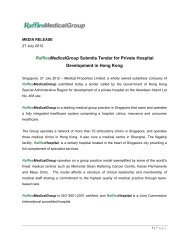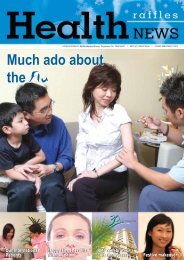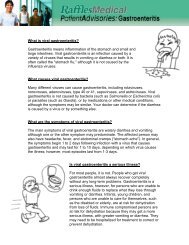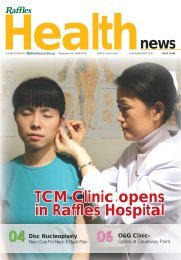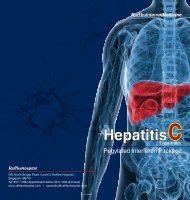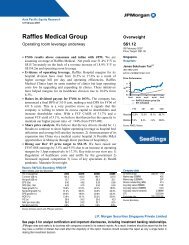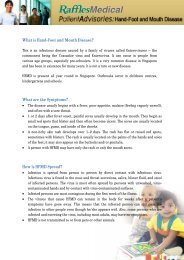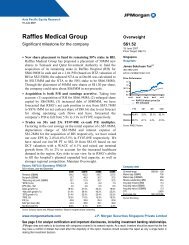Cancer You - Raffles Medical Group
Cancer You - Raffles Medical Group
Cancer You - Raffles Medical Group
Create successful ePaper yourself
Turn your PDF publications into a flip-book with our unique Google optimized e-Paper software.
<strong>Raffles</strong> HealthNews Feature 11Can we ever severties with Mr Kansir?These genetic tests depend on theinherited cancer syndrome involved. Forinstance, the gene involved in breast andovarian cancer syndrome, is the BRCA1 or BRCA 2. There is usually a mutationin either of these two genes and this canbe determined with a simple blood test.People who are at risk of a hereditarycancer syndrome should enquire with<strong>Raffles</strong> <strong>Cancer</strong> Centre or speak to theirdoctor for a referral for cancer gene testing.This is a comprehensive package thatincludes pre-test risk assessment as wellas pre and post-test genetic counselling. Amedical oncologist will interpret the resultsand make individualised recommendationsthereafter.The potential benefits of genetictesting are that informed decisions canbe made about the future, includingsteps to reduce cancer risk. Thedoctor is able to discuss and makeappropriate recommendations aboutrisk-reducing surgeries or preventivedrug therapies. Close surveillance canalso be carried out to detect and treatcancer early. This has been proven toimprove survival. There would also bean option for genetic testing of familymembers, especially one’s children.Finally, there would be relief fromreduced uncertainty and reassurance iftest results were negative.Unfortunately, there are alwayslimitations to any test ordered. Thisincludes attaining results which are notpossible to interpret (ambiguous results),such as the presence of genetic variantsof uncertain significance. Rarely, theremay also be false positive or negativeresults. Last but not least, there may bepsychosocial impacts such as fears ofdiscrimination. Hence, genetic testingshould always be conducted withappropriate genetic counselling.Absolutely, it is possible to stay cancer-free!A positive test result generally indicatesthat a person has inherited a knownharmful mutation in genes and, therefore,has an increased risk of developingcertain cancers. While a positive test resultprovides information about a person’s riskof developing cancer, it cannot ascertainthat an individual will actually developcancer or when. Not everyone who inheritsthe harmful gene mutation will developcancer, as there are many other factors totake into consideration such as tobaccoexposure and one’s lifestyle.For someone who has a strong familyhistory of cancer or who knows that he orshe has inherited a cancer susceptibilitygene, it will be best to see a doctor whois familiar with the cancer syndromefor regular follow up, advice, and closesurveillance. If necessary, preventive drugtreatments or preventive surgery may beundertaken. Be proactive to prevent anddetect cancer early.What good news for those who havestrong family histories. <strong>You</strong> can stillevade cancer with close surveillance,early detection and preventivemeasures. HNSelected cancer predisposition syndromeHereditary breast and ovarian cancersyndromeFamilial adenomatous polyposis (commonlymanifest with colon cancer)Hereditary nonpolyposis colon cancersyndromeVon Hippel Lindau syndrome (commonlymanifests with kidney cancer)Gene involvedBRCA1 and BRCA 2APC, MYHMSH2, MLH1, MSH6, PMS1,PMS2VHL



